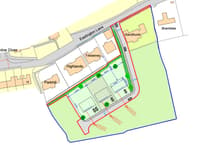ALMOST 700 people in West Devon may be using water that has a higher than acceptable level of radon, a new survey has found.
The study, commissioned by the Environment Department and the borough council, found that eight per cent of private water supplies in the area could have a higher than acceptable level.
Around 18 per cent of residents, approximately 8,460 people, have private water supplies such as boreholes, springs or wells.
Of the 116 properties on Dartmoor sampled, 18 were rated as 'too high' — more than the National Radiological Protection Board standard of 1,000 becquerels (radioactivity units) per litre — some as high as 5,341 bpl.
Nick Payne, West Devon's head of environmental services, at a press briefing on Tuesday said anyone on a private water supply in the borough who was concerned about the issue should seek advice from the council.
Radon, an inert gas present in the earth and in water, has been linked to lung cancer in research studies around the world. Experts suggest that boiling moor water, or using it in washing machines or dish washers, and then inhaling the steam could increase the risk of lung cancer.
This is especially true among those most vulnerable to the disease, such as smokers. To a lesser extent, radon in drinking water is believed to contribute to stomach and bowel cancers.
Sarah Harrison, health consultant for the South and West Devon Health Authority, said: 'We are talking about small risks, from lifelong exposure.'
South West Water has assured the council that there is no danger from public water supplies.
The survey also looked into uranium, but concluded that its level was not high enough to constitute a potential health risk.
As well as the health issue, there is concern about the effect on the price of properties which have been identified as standing on radon-rich ground or dependent on radon-rich water. The problem of house prices is exacerbated by the fact that in the same road some houses may be affected by radon and others not.
New building is governed by regulations on radon, but there are still no legal requirements on old houses. Workplaces are subject to rules laid down by the Health and Safety Executive.
There are several possible remedies, according to Trevor Gregory, a member of the South West Radon Group, an environmental officers' organisation.
'Some boreholes can be shut down and the users moved on to mains water,' he said. 'It is also possible to aerate the water to remove the gas, a technique which has been used successfully in the US.'
'The cost of taking action is not high,' said Dennis Papworth, president of the Radon Council, an independent regulatory body.
'For £500 to £1,000 a house can be made safe. A sump can be installed to collect the gas and channel it out of the house.
'But there has been a lack of political interest in doing anything except measuring the problem.'
He said that around 2,500 deaths a year were caused by lung cancer which stemmed from radon — 'a lot more than are caused by CJD.'
Clive Frederick-Preece, of the Cornwall Radon Company, said: 'In the US, states are compelling water suppliers to ensure that water is safe, but there is no such mandatory requirement over here.'
Devon is rated as the second most radon-affected county after Cornwall and has a particular problem with private water supplies, which Cornwall does not have.
The whole of West Devon is heavily affected by radon and it is one of the most affected boroughs in the country.
Dave Banks, the council's environmental health manager, said the Government should pay for more local authorities to carry out surveys on the risks in their areas.
West Devon and Torridge MP John Burnett congratulated the council on carrying out the survey and urged private water supply users to seek advice from the council. 'I agree that more radon studies should be funded by the Government,' he said.



